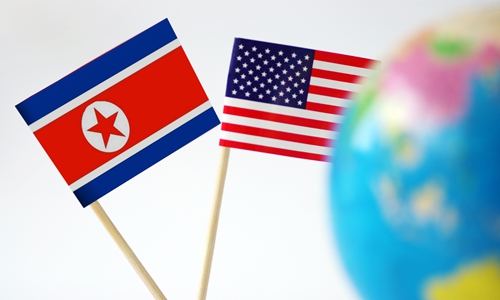HOME >> OPINION
Inherent US hostility against North Korea makes it hard to resolve issues
By Li Haidong Source:Global Times Published: 2019/11/21 21:18:41

Photo: IC
With US Defense Secretary Mark Esper's Sunday declaration of indefinitely postponing a military exercise with South Korea, the chances of tensions reemerging on the troubled Korean Peninsula seem to have been nipped.
The suspension of the war games announced during the Pentagon chief's South Korea visit, however, does not mitigate the complexity of the fraught situation on the Korean Peninsula.
For quite some time in the future, the peninsula's security will remain in an intense flux. Hostility is deeply rooted between the two Koreas due to foreign military presence on the peninsula and Pyongyang's alleged possession of nuclear weapons. In addition, US deployment of Terminal High Altitude Area Defense system in South Korea and the US-led alliance's efforts to dominate the security framework on the Korean Peninsula have led Northeast Asia into a lasting game between big powers inside and outside the region. Although the international community and stakeholders have expressed willingness to settle divergences, the major causes of tensions have not been removed and keep popping up.
The US has been strengthening its military presence on the Korean Peninsula and frequently conducting small-scale drills with South Korea, leading to continuous strains in the region. Moreover, Washington treats the Korean Peninsula nuclear issue as geopolitical competition among major powers and regards the issue part of its strategy to contain Beijing and Moscow.
Such being the case, negotiations on the Korean Peninsula nuclear issue have made no progress in the past two years as no party directly involved would change their approaches. Though the future is not that optimistic, negotiations need to continue.
Washington hasn't jettisoned hostility against Pyongyang. The key reason peace has still not been achieved on the Korean Peninsula is that after the end of the Cold War, the US, a country outside the region, has been inciting disputes on the peninsula to enhance the role of its alliances with South Korea and Japan in regional security affairs. Washington won't stop playing up Pyongyang's threat to stability on the peninsula so as to ensure its continuous presence in the region.
In the past two years, every move by the US has been aimed at weakening North Korea's defense capability and hurting the country economically, with a regime change as the ultimate goal. The US has never regarded North Korea as a legitimate regime. This has prevented constructive efforts for the resolution of the standoff.
The suspension of a major drill by Washington and Seoul is a high-sounding move to take Pyongyang back to the negotiating table, but the frequent small drills have shown real hostile US policy toward North Korea.
US President Donald Trump's unprecedented handling of the situation has to some extent mitigated the tensions, but his innovative approach has been boycotted by mainstream political elites in his country.
The 2020 US presidential election is coming. Trump is definitely unwilling to see his efforts on resolving the Korean Peninsula crisis adversely affect his election. He is likely to seek another meeting with the North Korean leader in an attempt to make some diplomatic achievements that he can boast of to the electorate.
But US-North Korea relations, as well as US ties with other powers concerned with the Korean Peninsula issue, are deeply rooted in every country's own national interest. Trump cannot change US elites' existing notion of North Korea policy, nor the US political culture with inherent hostility against the North Korean system. Even if Trump has already adjusted his North Korea policy, even if the US-South Korea large-scale military exercise has been postponed indefinitely, the so-called goodwill can hardly change the cruel reality - Washington's hostile policy against Pyongyang is likely to remain, and the future of the Korean Peninsula will stay strained for a long time. It is hoped that such tension will not spin out of control.
The author is a professor with the Institute of International Relations at China Foreign Affairs University. opinion@globaltimes.com.cn
Posted in: VIEWPOINT,ASIAN REVIEW